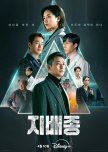
Crisp and tasty KDrama - revolving around some hot topics that one might rather want to call sci-fi
Intelligent, sharp, with strong characters. A crisp and tasty KDrama. “Blood Free” got me immediately - with an original hook, set within a gripping milieu, topped by thoughtful demeanor of interestingly authentic protagonists and splendid casting.Of course, the interfering natural interest of those in power (who obviously can never keep their hands off) is not at all surprising. Yet, the processing of some rather hot contemporary issues was presented in a refreshingly concise manner. Including topics that one might call a dream of the future... A bit far-fetched here and there? Perhaps. Nevertheless, often enough well grounded in common sense.
I assume there could as well be a second season... because the end doesn´t necessarily have to be the end, does it?
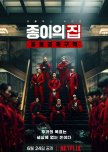
Korea´s socio-political North-South dynamics suspensefully catapulted into mass consciousness
"Money Heist: Korea - Joint Economic Area" is a remake of the Spanish Netflix production "La casa de papel". As with "Designated Survivor: 60 Days", "Suits" or "The Good Wife", this South Korean remake also sticks closely to the original. Many viewers may work through what is better, whether it is necessary, etc. - Not me, though. Rather, what fascinates me is how specifically Korean socio-political dynamics have been woven into the present story and suspensefully catapulted into a global consciousness.Against this background, the series is truly brilliant. Most viewers might probably miss this or could care less, and thus don't even pay attention to it. Nevertheless, this or that might eventually fall in places, unconsciously. Be as it may be...
"Money Heist: Korea - Joint Economic Area" takes place in a fictional economically united Korea. This premise as a setting alone is ingeniously visionary, because it conveys into the mass consciousness such a not sooo unrealistic agreement scenario for the stuck situation between the two countries: An economic union that could be profitable and attractive for all sides... Yet, immediately the potential stumbling blocks are swimming in the wake... Exploitation, fraud, abuse! The promise of freedom and unlimited opportunity turns out to be just more profit and opportunities for those who are already living in the fast lane. The promising scenario for peace and prosperity for everybody might be one side of the coin, a raised index finger is pointing to the other side already: Attention! Wiheom! Danger!
"Money Heist: Korea - Joint Economic Area" is provoking with a dramaturgical "Hello-Wake-Up!" - On the one hand these potential capitalist dynamics could make a promising peace scenario possible, but on the other hand, in the same breath, would also torpedo it. This is where the big plan of the 'professor' comes in. He wants to counteract the machinations of the powerful, who are busy filling their already full pockets, regardless of those, who pay the price. Thus he comes up with a spectacle that will shake up the public (and their decision-makers). In the end this might ultimately force the system to be more mindful and aware in approaching a true joint venture in order to make it work for the people (not only the CEOs and the powerful).
In this context, the characteristic difficulties between Koreans from North and South are successfully demonstrated again and again: the deep distrust that has been actively cultivated for so long. The fear that the war, which has officially not ended yet, will openly continue. The constant spying. The contempt for the other system. All of this was politically tirelessly staged for more than half a century. Families were being torn apart almost at random back then (1950s) - like in Germany after the Second World War. At a time X, some were on one side of the boundary line and others were on the other. Coincidence. Fate. What followed after that was propaganda, both here and there. Building up an enemy image. And what was done back then, even if the framework conditions for rapprochement might been created, has to heal over time first. (This can be learned by the experience in Germany: having reunited for more than three decades, still in society the 'wall' between ´Ossis´ and ´Wessis´ has not yet been truly overcome...)
"Money Heist: Korea - Joint Economic Area" succeeds in weaving a realistic future scenario for a united Korea into an exciting story. With all difficulties and opportunities. In this respect I consider this KDrama a strong production. In doing so, the KDrama brings this possibility of a Korean peace closer into the mass consciousness - first of all for the South Korean society, which is extremely sensitive to this topic, but ultimately also for the rest of the world.
I also have criticism.
This is neither concerning the story nor the actors, on the contrary. And it is not about the fact that connoisseurs of "La casa de papel" will be strongly reminded of the original (including the names of the characters). No. I rather have a more general complaint regarding many Korean Netflix productions (vs. the national KDrama TV productions).
-First, there is the spice up of the narrative style for an international (rather male) eye that is generally used to a good portion of sex & crime and a higher pacing. Well, I don´t need it.
-Second: Why not really telling the story to the end? Yes, it could be "worth" one or more seasons, but nevertheless. They even split the first season into part 1 and 2. I don´t like it.
-Third: The sensitive emotional momentum, that is so crucial for KDramas, is reduced to the max. Yet, the strength of a KDrama, in my experience, is that we are emotionally drawn inside, that we identify ourselves, feel empathetic, and get very close to the protagonists, get involved into their world. International Style on the other hand is rather characterized by keeping a critical distance. Here the audience is watching from the outside. The story and acting may grab you, but you stay outside and watch. You don't necessarily get emotionally involved. What is happening will be and will remain the story of others. In this particular case as well. So unfortunately once again a central KDrama unique selling point was abandoned for the standards of international Netflix world. This is not necessarily bad, yet different. I would say the experience of watching is less intense compared to other KDramas.
Luckily, the KDrama in general has more than one crucial strength and can instead show off some of those others. So does "Money Heist: Korea - Joint Economic Area"...
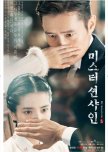
This KDrama is more like an epic movie that (fortunately) doesn't want to end over 24 episodes
"Mr. Sunshine" is pure epic! Visually stunning! Heartbreaking. With a fantastic cast! In addition, there is a vivid and at the same time gripping history lesson (dealing with the turn of the 19th / 20th centuriy). The KDrama is more like an epic movie that (fortunately) doesn't want to end over 24 episodes. Complex characters, interwoven developments with sudden twists, cinematic camera, unforgettable soundtrack, everything seems handpicked, nothing off the shelf. The budget was correspondingly high, but it isn't just good because it was expensive. Rather, it is made with a lot of love from front to back and down to the last detail. There are hardly familiar motifs that we have often seen in variation. Everything is precisely coordinated in all scale levels. The personal decisions that the protagonists make over and over again in the course of the story remain unpredictable until the end.Historically we learn about the relationship between Joseon and the Japanese, but also with the rest of the world. The story takes place before the country becomes a Japanese protectorate - in that brief window of time when Joseon (after a long period of isolation) became the Greater Korean Empire and then opened up to the rest of the world. For this reason, the USA also play a role in here, because the States - like Russia and Japan - are ready and waiting to get involved in the imperialist competition for the largest slices of the cake Joseon is offering. The country is rich in raw materials and therefore hot property. "Mr Sunshine" provides a vivid and gripping introduction to those geopolitical complications.
------------------ SIDE NOTE --- Historic setting: Joseon and the rest of the world ...
Since the 17th century, Joseon rather had itself isolated from the outside world. This rigorous attitude ultimately led to the first military confrontation between Joseon and the USA, which marks the kick off point to the plot of "Mr. Sunshine". In 1866, an American ship, the SS Sherman, entered Korean waters via the Taedong River. Since it did not turn around immediately when asked, there were violent arguments in which the ship was ultimately set on fire. This was followed in 1871 by the battle off the island of Ganghwa-do, in which the USA wanted to rescue the survivors of the shipwrecked crew and at the same time establish the first prerequisites for trade relations. However, since the desired diplomatic gesture of the Korean apology did not happen to take place, the Joseon garrison on the island was radically wiped out by the American warships and their crew. This first conflict with the USA went down in history as 'Shinmiyangyo'.
King Gojong came to the throne in 1873 and, in contrary to previous national policy, decided to open up his country in the hope of flourishing trade and technical innovation. Japan pushed ahead and forced the Japanese-Korean friendship treaty of 1876 on the king, including military pressure, too. However, this was a contract between unequal friends... In the course of the international processes that had been initiated, King Gojong also sought contact and trade agreements with Western countries.
---------------------------------------------
During this time, "Mr. Sunshine" stages its main plot, in which protagonist Eugene, as US officer of loathed Korean descent, is supposed to sensitively, competently and diplomatically represent the interests of the USA with a consular mandate. But there is always more life has to offer... Eugene has to meet the love of his life, face his roots and reconsider his values in life. He can´t help it: he has to take a stand...
It is said that not everything is historically 100 percent precise, but the historical circumstances provide plenty of material for pure epic drama at its finest. Thrilling. Unforgettable.

Brutal, merciless milieu of gangs & drug cartels. Stirring, gloomy but with soulful strings, too
What a positive surprise. For all those who are not afraid of the brutal, merciless milieu of gang wars and drug cartels: "Worst of Evil" offers intense characters with dynamic profiles, especially of the two protagonists - the rural police officer who joins a new Gangnam gang as an undercover agent, to help uncover the organized drug trade between China, South Korea and Japan, as well as the boss of that Gangnam gang.In particular, Ji Chang-wook as Park Jun-mo alias Kwon Seung-ho puts his heart and soul as well as quite some muscles and fighting into it. Whatsoever, he is impressive. But so are the others. It´s well cast and Disney+ apparently didn't skimp on anything...
For me personally, gang stories like this one aren't really my first choice. Too much crude violence, too much highly concentrated testosterone... "Worst of Evil" is no exception. Sharp blades and baseball bats are in high demand, especially in the first half. Nicotine seemingly acts as nutrition and even the fanciest suits can't hide the fact that a lot of blood is being shed unscrupulously...
Nonetheless.
“Worst of Evil” features complex characters and highly explosive relationship dynamics that is touching, gripping and, more importantly, provides emotional substance, too.
Eventually, undercover operations are psychologically demanding. The boundaries between true and false identity are blurring. A solid compass for right and wrong can easily be lost. The reality of living the undercover life creates new truths in which even the 'false' identity becomes a ´true´ part of one's own life. Coming to terms with this obviously is not easy. The return to the old life as it was before, even less so. In the case of "Worst of Evil", these internal and external conflicts of our undercover investigator become even more difficult by the fact that his wife has a history with the gang boss that he knew nothing about. She, his wife, herself a police officer and officially not ´his´ wife in terms of the new undercover identity, is now drawn into current affairs in a way that the small special investigation team could not have foreseen.
Not to mention the fact that the drug cartels involves powerful partners, not only in South Korea, but also in China and Japan. At last, the homicide police also get involved in dealing with everyday gang activities and murder cases in Gangnam. None of those involved is squeamish whatsoever. So danger lingers everywhere. Not only fists and fights, but also intelligent, diplomatic solutions are required. High-end improvisation is on the agenda for our hero.
"Worst of Evil" is thrilling, stirring, gloomy and – despite all the blood that boils over and over again (and all the copious amounts that are spilled) – it has its soulful strings, too. It's about trust, loyalty, bromance, the relativity of 'right' and 'wrong', and ultimately the ethical question of which end justifies which means...
Is the story predictable? Well, I can't fully deny that. But in "Worst of Evil" the journey is clearly the destination - what the undercover special operation DOES with this once "mother-in-law's favorite" and how he comes to terms with it. In addition, his counterpart, the self-proclaimed, brash, brilliant gang leader, is also quite interesting. With his vita, his goals and desires, he doesn't really fit into the usual cliché and thus brings additional dynamism. In addition, several other characters in the cartel (and police) environment impress with strong profiles, too.
As I said, I was pleasantly surprised. "Worst of Evil" had me. It's pretty well made all around and has actually more to offer than just ruthless gangs and action. (Nevertheless, be prepared, it still is about the milieu of ruthless gangs...)
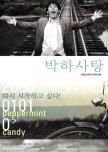
Not nice to watch but definitely worth seeing. Superbly done in many ways. Powerful. Resonating.
Prolog:The conclusion for the protagonist in his late 30s is rather tragic: he´s getting the urge to go back. He wants the life of his late youth back. He cannot continue with who he is today. For him, there is only one option remaining – a shortcut to the exit.
However, for the audience, the end is actually the beginning. The journey goes backwards in seven chapters. And when we finally reach the start, it actually makes sense to look at the ending again... (in movie-terms: its beginning...)
-------------------------------------------------- ----
“Peppermint Candy” was one of the top ten movies in 2000. The international awards it collected are respectable. And even in 2022, “The Guardian” has it listed in 12th place among South Korean film classics. Meaning: It was topical back then and still hasn’t lost its impact. It´s cult. It can be considered particularly valuable. However, it´s not particularly nice, though. Rather particularly powerful and ferociously intense.
"Peppermint Candy" dates from 1999. It tells the story of the previous two decades of South Korean history using the example of an arbitrary, inconspicuous individual. For audience who isn´t firm in recent South Korean history, the KMovie may be reduced to the protagonist as an individual - to his very personal story and his tragic ending. For all those who know something about the historical, social background (see the side note below if you like), the KMovie becomes a memorial on screen that commemorates all those in society who were probably thus affected in one way or another, too, and may have had a similar experience. And there were quite a few.
In 1999, South Korea looked back on two extremely eventful decades. Two decades that were endured, sustained, borne by the people... Two decades that, in addition to democracy, turbo-capitalism and material prosperity, also produced a whole series of psychological cripples.
I actually don't like the word 'cripple', but somehow it seems appropriate in this case, here in the sense of: people who were maltreated by others or 'by life´s circumstances' to the point of psychic unconsciousness (even if perhaps they themselves were involved as perpetrators, too). People who were broken by their fate and trauma, not being allowed to and/or able to talk about it. People who fell, lost themselves, could no longer get back on their feet, feeling helpless. Completely bent. People who could not find peace with their shame and guilt. In their inability to communicate about it and get help, they became a total human failure for those around them.
In reverse "Peppermint Candy" portrays the career of such a psychological (and physical) 'cripple' in intense scenes. We may acknowledge the individual fate. Even without historical background and regardless of socialization, we acknowledge a broken soul, of which all that is left to the outside world is actually an 'asshole'. Once a poetic, delicate, sensitive spirit... it´s hard to believe. Actor Sol Kyung-gu expands the entire range of his skills, convincingly and uncompromisingly drawing the audience into each of his divers crucial, rather unpleasant emotional life situations.
“Peppermint Candy” is superbly done in many ways. Not too much, not too little. Ruthless. And in pointed, symbolic imagery, the scenes gain in emotional power and meaningfulness as they progress - even after we have travelled a few sequences further (back) - to the extent that the puzzle of drastic life events accumulated are coherently put together into a pile of shards.
The protagonist in "Peppermint Candy" is experiencing the significant historic events of his generation at the forefront. His psychical downward spiral cannot be stopped. But this protagonist is no exception. Countless people in their late thirties in South Korea in 1999 could have told such or similar stories. During those traumatizing two decades the public was carelessly left alone to individually deal with what had happened. What a person experienced emotionally, what a person had to process and couldn't, the decisions made, the guilt, the shame, the pain – the answer to that was mainly psychological repression and silence about it. The consequences in everyday life: Outbursts of acting up and/or apathy. Sometimes the old wound hurts again. The old wound makes man fall to the ground, by its pain that he cannot escape. But it is also a phantom pain - the desperate suffering over an essential piece of 'who I am' that was taken away once and for all...
The protagonist in "Peppermint Candy" suffers on behalf of an entire generation of anonymous young people who were quietly worn down, deeply psychologically shattered and finally by the two decades of the 80s and 90s, the time of transition from military dictatorship to modern capitalism existentially bankrupt. The KMovie reaches out to all those who may have had a similar experience and/or were able to sympathize. Where communication had been lacking for decades, the KMovie, with its sometimes disturbing insights, tries to build a bridge: with understanding that may even extend to empathy. "Peppermint Candy" manages to connect the South Korean people through the fate of this one fictional man and his personal environment. (Additionally, it may even touch the rest of the world). Yongho, who could be 'anyone', and with him the women in his life, his friends (?), his colleagues and his victims who had crossed his path, who could also be 'anyone'…
Not nice to watch. But definitely worth seeing.
Powerful. Resonating. A convincingly empathetic work.
A work of passion.
--------------------------------------------------------------------------------
SIDE NOTE: --- Brief overview of the historical background of South Korea - regarding May 1980 in Gwangju, the 1980s under repressive police violence, and the years of economic miracle up to the Asian crisis of 1997-1999. ---
May 1980 in Gwangju, South Korea, featured a bloody massacre that the police and military were ordered to carry out on their own people. Yet, that massacre of Gwangju remained an official taboo for almost two decades. What happened in Gwangju back then was kept secret from the rest of the country. Then, the city was deliberately cordoned off. The enemy was officially called 'communism' (especially in student circles, supposedly under the infiltrated influence of North Korea.)
Those who survived May 1980 in Gwangju and perhaps could or would have wanted to talk about it were pressured, persecuted, tortured and put in camps. The others who preferred to remain silent had to figure out by themselves how to emotionally digest what had happend.
President Chun Do-hwan, who succeeded his predecessor Park Chung-hee in the aftermath of the bloody spring of 1980, did not create any less autocratic structures for the common people than before with his dictatorship. On the contrary. With him, brutal torture was carried out in the spirit of a systematic cleansing. The years of Chun Do-hwan's rule were some of the worst for South Korea in terms of political repression. His mission: The country should use all its might to present itself to the rest of the world as dazzling and up-and-coming until the Olympic Games. Whatever/whoever was bothersome was put away. However, the autocratic rule of the dictator and his brutal power apparatus with police and secret service ended in 1987 as a result of unbridled, enormous public pressure. The people's longing for democracy was finally able to prevail.
Parallel to the repression under Chun Do-hwan, the 1980s and following years were characterized by the years of economic miracle. The market became increasingly liberalized and it was all about exports. Yet, on a large scale growth and prosperity were built on credit: direct investments from abroad, credit cards for the people in the country, loan sharks for all those smaller companies that couldn't get the money from the banks. But the bubble of the expansive credit economy of the 1990s burst in 1997 with the Asian crisis. The credit boom was followed by a crash, an enormous fall in the value of the won, a series of bankruptcies, unemployment all over the place and poverty for the many.
Even though South Korea got back on its feet astonishingly quickly in the course of the subsequent years of the so called IMF Economic Crisis, the path was marked by countless fates of bankruptcies and many families suffering from for a long time since.
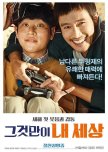
Disillusioned life scenario, yet spiked with moments as the ego steps aside + heartopening happens
A wonderful movie in many ways.This KMovie is aiming straight at the heart. This is already indicated in the international title "Keys to the Heart". Also, that the piano plays a key role - i. e. its 88 white and black keys.
The original title is more like "This only is my world" and refers in its own way to the piano, because this is the world of the autistic protagonist Jin-tae. However, this also refers to the (also limited) world of his brother Jo-ha, to which Jin-tae starts belonging. Additionally, revolving around Jin-tae (and Jo-ha) is their mother. "Keys to the Heart" is a story about that mother and her two very different sons. She left one of them decades ago as a little boy under dramatic circumstances and to date he hasn't forgotten, let alone forgiven. The other is autistic with savant syndrome.
It´s a given that the story intends to bring tears to your eyes. Yes. The story wants to get to the heart. But not generally in a tender, comforting and blissful manner. In fact, there is nothing but pain drifting around those hearts in this story. The framework of the plot draws a disillusioned, depressed scenario of the lives of ALL characters - regardless of whether they are rich or penniless, or otherwise have a more or less comfortable living. (The exception to the rule here is the autistic Jin-tae.) As if it were the most natural thing in South Korean everyday life for people to suffer. There is a good deal of social criticism in this KMovie. I think that's often overlooked in its critics or reviews.
There's the drinking, beating father; the abandoned son; the penniless son who can do nothing but box; the brutal world of dog fighting, where boxers beat each other bloody for money; the single mother with cancer; the mother with guilt; the autistic son; the depressed, suicidal, rich, once famous invalid; the Jaebeol CEO, whose money doesn't help her to be able to buy back her daughter's happiness. Eventually "Key to the Heart" is a dreary, sobering contemporary document. Not a picture of society of the crisis-ridden 1990s, no. It is a simple, unpretentious social inventory of the South Korean affluent society from the year 2018...
Now, some heart-warming light is shining into this fundamentally gloomy everyday world. (And in those of the audience as well.) In rather small spots though. These are brief details, inconspicuous moments (apart from the big spotlight of the finale, which is a bit more spectacular). However, those little spots make all the difference. Not a flash of inspiration, rather a flash of the heart, in which the injured ego steps aside for a moment: for a moment of clarity for the essential: actually, what´s NOW. For a moment, people can just let go of all grief and become open to what life has to offer just NOW: beauty, warmth, joy, hope. This NOW can transform, heal, completely change the view of the world. The world on this earth itself is the same, yes, the planet does not change its orbit because of it. It's not suddenly 'everything will be fine again'. And yet it is something like 'everything-IS-good'. ... That brings us to the KMovie's favorite quote: "Impossible is not a fact. It's an opinion." (Muhammad Ali)
Admittedly, a button is pressed when it comes to the piano music. The classics take their space. But here, too, the story does not fail to take the opportunity to point out the ego-driven business with it - the talent and passion of the musicians may be on the one hand, but the very personal interests of teachers and directors are on the other...
Of course, with Jin-tae as a young man with an autism spectrum disorder with savant syndrome, the KMovie is deliberately pressing another selected button, with the intention of moving hearts. Nevertheless, even this developmental disorder is not romanticized, yet shown as demanding and exhausting to deal with.
Particularly pithy and powerful: The contrast between the world of the buttoned-up, reserved, respectable, reasonable and properly dressed classical music scene and the childlike, impulsive and playful but brilliant Jin-tae, whose piano playing tears down walls for a moment.
At last, we are back at the beginning: a story about that mother and her two very different sons... There is hurt, sorrow, the pain of loss and guilt - all is there, what life has to offer to become estranged from each another, or to feel lonely and abandoned. And that's where love - no matter how screwed up - finds its screwed-up moments. I don't think predictability is a problem with this movie, because it doesn't want to be 'enthralling'. Yet, it wants to touch the heart, and it does. Eventually, that's good for everyone. With this movie, it is the HOW that is decisive: by sober narration of a basically rather depressing story that thrives on short, unspectacular moments (and the actors) in which 'new' NOW-decisions are made and heart opening becomes possible.
Great!
--------------------------- SIDE NOTES --- Savant syndrome ---
Savant syndrome has often been a topic in the cinema, for example in the US production "Rain Man". There are only around 100 "Savants" known worldwide (from the French 'savoir' = knowing, how to do it). Accordingly, the phenomenon has only been scientifically examined to a limited extent. In the musical field, there are various examples of Savants (like the fictitious Jin-tae here in the movie) who, without any music lessons, are able to play the most difficult pieces of music with accentuated detail after just hearing it once - solely thanks to their perfect hearing.
However, Savant syndrome usually goes hand in hand with autism spectrum disorders. This in turn refers to developmental disorders of varying severity. The people affected typically have little interest and competence when it comes to social interaction. They prefer to live in their own world. Generally, their perception is strongly focused on details and does not weight them like the otherwise socialized majority around them. Details that others usually overlook become subjectively crucial, while information considered essential to their environment may not play any particular role at all. Information is initially unfiltered, being of equal value in its perception. Thus, without the social-cognitive filters that non-autistic people learn to develop, the moment of sensory overload followed by stress is quickly reached.
--------------------------------------------------------------------------------------
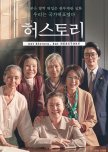
It is not a fun movie, yet it is radiating truly positive energy in spite of its appalling topic
"Herstory" is an example of a highbrow KMovie, which has real life as its subject and at the same time influences real life as an impact of the movie reception.It is about the lawsuit brought by a handful of "Comfort Women" from Busan - actual long forgotten/ignored sex slaves for the Japanese soldiers during the Second World War. The trial took place between 1992 and 1998 in Japan. This noteworthy trial set in motion the resolution of a rather dark chapter in recent Asian history.
It was about time to not look away anymore. The subject of "Comfort Women" was until then a taboo subject even in South Korea. The refered to court hearing in the 1990s was actually a milestone in the reappraisal of this chapter. Thus the KMovie "Herstory" is a poignant, publicly effective monument to this chapter in history and honoring the affected, victimized and long forgotten women (and their advocats).
"Herstory" is sensitively illustrating the painful path to this (no less painful) trial as well as its dramatic individual cases. The KMovie becomes the mouthpiecer of at least a few of those women´s fates and at the same time a touching memorial, arousing the awareness of the cruel war crimes committed against civilian women.
It is not a fun movie, yet it is radiating a tuely positive energy in spite of its appalling topic! I consider it in several respects highly valuable.
It is about empowerment and sisterhood. The cast ist outstanding.
This movie is confronting glorious ´his´stories with ´his´ rather tabooed ignominious behaviours... and thus make it ´her´stories.
---------------- SIDE NOTE --- Historical Comfort Women in World War II ---
For a long time, the fate of an estimated 200.000 Korean young women and girls, who were traumatized as sex slaves by the Japanese military during World War II, went unnoticed by the world. Until the 1990s their existence was a taboo - even in South Korea! In fact, Japan's government and military recruited (mostly) Korean young women and girls. They were used against their will in so-called "comfort stations" as "Comfort Women" for motivation of the armed forces - i.e. as sex slaves being abused by the sodliers.
Officially, this fact was (and still is to some extent) vehemently denied by the Japanese side and hasn´t been clarified for more than 5 decades, let alone talked about reparations. However, in terms of international law, what happened has to be considered war crimes, crimes against humanity, as well as slavery and trafficking in women and children - crimes they are. However, the war crimes tribunals after the end of the Second World War were more concerned with crimes against members of the Allies. So in public THOSE crimes against civilian women were forgotten.
With this particular court hearing the movie is refering to, for the first time a verdict in favor of the (comparably few) plaintiffs was at least partially reached. The ladies, who had meanwhile aged, were actually awarded a ridiculously small amount of compensation. So the verdict is still outrageous, but a verdict nonetheless. Nevertheless, as a result, the story of comfort women was publicized for the first time and an international reparation movement was launched.
Obviously the topic had appeared on the table ... but it was still not legally clarified. On the contrary. The issue as such (and its many and even more individuale cases) have still not been satisfactorily resolved ... while most of the actual victims have by now died of age.

Not world-shaking at all, though it can be quite witty at times
It's about a vampire who wants to become human. However, fans of vampire stories alert! "Heartbeat" is at best Vampire-'light'. First and foremost, this is ´Rom´ with double ´Com´. It is casual entertainment, its topping made of tried and tested patterns, and clichés, too.Essentially, "Heartbeat" thrives on the special relationship dynamics between the two protagonists, with a rather intractable young woman crashing into an old vampire, who has been robbed of his supernatural powers/resources and who, due to a mishap, is now neither really vampire nor human. The humor and charm of the story lies in this somewhat awkward constellation. Determined female protagonist meets bewildered, somehow lost within identities male protagonist. The whole story is embedded in a stylish, handsome ambience as well as this and that (four-dimensionally knitted) subplot. Romantic vibes are guaranteed and on top of that a bit of suspense, too.
"Heartbeat" isn't world-shaking at all, though it can be quite witty at times. It's fun when you're in the mood for it. With a down-to-earth female protagonist whose everyday life (for a pleasing change) is not predominantly structured by wardrobe and make-up.
Here and there, however, production obviously chose the striking to the logical: No money but the large property always in festive lighting? The protagonist's gothic chambers always bathed in the candlelight of countless candles, regardless of whether he is there or not? (And who would be in charge of this? He never has to light it up, nor blow it out when he leaves... they are always burning.) Well. Ok, let´s not nit-pick…
"Heartbeat" obviously doesn't take itself too seriously when it comes to such details. If you can overlook this and that, then it´s fun@work... as fun and light entertainment are clearly the goal. So, don´t expect more than that.
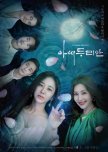
RomCom, crime, historical drama, fantasy & Makjang make the dough for something standalone new
"Durian's Affair" is set among the wealthy - ´here´ (2023) and likewise ´there´ (long gone Joseon days). The time may have changed for Du Ri-an and her daughter-in-law, but the place has not. They are instantly catapulted from their Joseon days to recent today. Some of the wealthy family, who own the property today, have apparently reincarnated again in this family. They are especially well known to Du Ri-an. Now those involuntary time travelling ladies have to deal with the culture shock and the traumatic leap in time that actually seems as incredible as a dream, whereas in their own days they were actually in the midst of grieving over the loss of their beloved son/husband...This bizarre, four-dimensional dramaturgical setting is providing a load of finely knitted entanglements and arising questions, yet unanswered. What had really happened back then? What's going on today in this family? Why the time jump? So what's next for the two Joseon-day ladies? How is everyone going to deal with this weird practical (and for some even emotional confusing) situation?
This production is full of zeitgeist of the 2020s, in which Anglicisms and Banmal (informal speech) are a matter of course, while in mass consciousness the curtain between different times and spaces has become extremely permeable. Yet, the icing on the cake: relationship dynamics in the fourth dimension. The people of that long gone time are not those of today. And yet... There are notions of their life back then, even if they cannot consciously remember it, as well as the option of making new decisions in their life today. Broken hearts, cupid's arrow, greed and passion, as well as a sense of responsibility or noblesse oblige... it's all mixed up through the perspective of the time-travelling ladies of days gone by. Situation comedy breaks through encrusted structures. The strangely insane is tossing and turning the minds of reincarnates and time travellers alike. Likewise, the strangely familiar is, too.
"Durian's Affair" is one of those KDramas that wants to break with established genres. The South Korean, but also the international market is currently being flooded with excessive KDrama productions. Thus there is increasingly space opening up for experiments... and that's what “Durian´s Affair” is, too. This KDrama is no RomCom, no crime thriller, no historical drama, no fantasy and also no classical Makjang. However, elements of each are richly included. Together they create something independently new. Anyone who is open to such an experiment should sit back, relax, shake off the usual expectations and get involved with the KDrama. It's entertaining. With some open questions that keep the suspension throughout all 16 episodes. There are also love interests. (Yes, plural.) All multi-layeredly entangled across time and space. Additionally, “Durian´s Affair” is even exuding a pleasant scent of humanness.
Be prepared for deliberate Sostenuto! The pacing is characteristic, since the production sticks consistently with the two outdated ladies from Joseon days. And in my opinion, those ladies are the ones who make the show as remarkable as it is. Regarding Du Ri-an and her daughter-in-law, all characters in the show as well as the audience alike can work themselves off. Nice!
----------------------------------------------------------------------------
SIDENOTE: --- A reckoning with the lost virtues of a conservative South Korean society ---
“Wheresoever you go, go with all your heart.” -Confucius
In my opinion, "Durian's Affair" is kind of a reckoning with pseudo-virtues of a conservative South Korean society. Du Ri-an and her daughter-in-law are catapulted into Seoul 2023 and show the elite clan around the Dan family what true Confucian virtue actually means. At the same time, they are caricatures as those virtues come along as an almost unattainable ideal. The two ladies from back then embody i.e. propriety, righteousness, integrity, benevolence, wisdom and trustworthiness in such an uncompromisingly consistent way that one cannot help but be amazed. Confucian virtues are inextricably linked to patriarchy. But the lesson in this idealistic self-image of a dignified, respectful life is given to us by two women! Adaptably creative, intuitive, respectful and well grounded. Timelessly human, righteous, wise and trustworthy.
Du Ri-an and her daughter-in-law embody the Confucian virtues, but more than that, they have transcended them without realizing it and found an answer for what these (and every other virtue, too,) are actually intended for: A source of self-confidence as a human being and dignity, from which a person can draw strength and grounding - even in the most adverse situations! In general, this as a prerequisite for any human, compassionate, authentic encounters. Those virtues had to be (necessarily, involuntarily) adapted by those ladies into a completely foreign century. (And they prove themselves again and again in every one of the three different households of the Dan family.) So it is actually about the core essence of any virtue: providing a human being with dignity and inner values as a compass – reaching out with the power of respect and thus transcending boundaries of specified classes, too.
The two time travelers come across as idealized caricatures of the bygone Joseon period, that is generally considered virtuous. As foreign ladies in Seoul 2023, they embody rather unreal, almost exaggerated ideals of virtues that are still upheld and (as it turns out) actually largely lost. And yet, the two ladies prove it: true, authentic dignity can grow from the upright embodiment of these virtues. This dignity matches its dramaturgical equivalent in the overall deliberate Sostenuto pacing of the K-drama.
The timelessness of the old values stands in apparent contrast to the growing western internationalized coolness and the elitist arrogant version of the new nobility, which however seems to have lost any grounding unless it is for money. It is rather obvious: a bit more humanness, morality, integrity, wisdom and trustworthiness would be nice here and there. What is offered above all is a shiny facade cushioned by the bank account. More or less covered underneath you find any human topic irrespective of class or wealth: longing to be loved, self-doubt, jealousy, gender issues, fear of aging, love in old age, temptation...
In "Durian's Affair" the head of the family clan may be a (actually surprisingly liberal) woman. Homosexual love can become a topic here, too. And then there are a few more time-sensitive issues in play. Yet, authenticity and sincerity are primarily triggered by the two noble, upstanding Joseon ladies... They may remind one or the other just by their attitude towards life, that human dignity is deeply rooted inside - even though one may have lost or forgotten about it along the way.
Don’t get me wrong. I'm not standing here for Confucian virtues. And neither does the KDrama. But it holds a nicely presented mirror to South Korean society, which to this day may hide behind the 'old, time-honoured' values. For better or for worse. If so, then it might be crucial to fill these virtues with life. Message: The present is far from that. Fascination? Yes. Attraction? Perhaps. But embodied? No. Two ladies from the past must be landing in 2023. (And actually they had to carry their baggage at home back then - a baggage whose weight was characterized by a questionable virtue (also) of the people of that distant time.)
“Durian´s Affair” rejects any kind of idealization. How nice, indeed! Yet it upholds authenticity (as a new and needed virtue?), basic for any respectful human-to-human encounter. As a value! As the true virtue! And with that - against this background - "Durian's Affair" becomes quite a progressive KDrama production. What a delightful surprise!
PS:
And then, the ending. It is open for all you can imagine. Any direction. You choose, where to go next. Drama just like the human condition (la condition humaine.) Like the wheel of existence, fueled by Karma! It goes on and on... A never ending story of birth and rebirth...
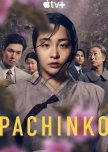
Not a KDrama, but a dramatic Korean story with a lot of Korean heart. (A hybrid?)
Ok, this series tells a Korean story, it´s about Korean destinies. BUT it's not an original KDrama. It is a (western) Apple production in which some (Apple) producers from the US obviously had a say. So, first of all, a bit of criticism about the American serial adaptation of a bestseller novel, which 'coincidentally' has a Korean fate as its subject. (Before I go into praise...)North Americans with Korean family backgrounds may have been involved in the production (the directors, the person responsible for the script adaptation and a lot of actors, for example). Nevertheless, it is and remains a North American production. The sad thing about it: the series production repeats - if you like - the theme of the story in a new media version: in this case, the profitable exploitation of 'Korean stories', 'Korean fates' and even a bit of the KDrama soul...
Using the example of several generations of a Korean family and their personal destinies against the background of Japanese colonization and racism to this day, why reduce a 500-page book to ONLY 8 episodes? Why not use the time and space and retell the story in at least 20 episodes, or even 50?
Quite simply: the series production is not of South Korean origin, and it is not made for South Korean television, but for the international streaming market. The rest of the world isn't THAT interested in South Korea, but it is quite touched by Korean fates. So, the enthusiasm for the original bestseller in a binge-capable, compact format has to be cleverly marketed in a colorful and moving way in order to attract new streaming subscribers to Apple. The world (those who have not yet read the book but have now watched the series) is shocked and touched by what happened between Japan and South Korea, which is still today formative for many Koreans. The rest of the world was hardly aware of this historical chapter. However, in the series adaptation, the individual fates were told less in detail. They were rather reduced to catchy basic emotions, and these were cleverly knotted as a cross-generational leitmotif in key scenes over time jumps. The focus is on Sunja - with the focus on Sunja in her third phase of life. This is embodied by Youn Yuh-jung, who was already able to leave a lasting impression on the international audience with (her Oscar for) "Minari" and thus gets plenty of screen time as a 'star' among many internationally comparatively unknown actors.
Well, that's the way it is.
If you have a background with KDrama, you will find a nice study object in "Pachinko" to compare the different narrative styles (Western style vs. Korean style) with regard to emotionality. Western style would be more like: 'I WATCH the mimes have their feelings'. The individual sequences of different timelines, some of which are strung together at very short intervals, convey this 'Western' handwriting. This is, so to speak, Western objectivity in the depiction of emotionality. The (South) Korean narrative style, on the other hand, deliberately draws the audience into the emotional world. E.g. 'I sympathize. I'm IN there too.'
So, with "Pachinko" there was a lot of Korean heart and soul mixed into the story and series adaptation. You can feel that. This is how an interesting hybrid production actually came about. It's not a KDrama, but a Korean story with a lot of Korean heart. Thus, the spirit of Korean storytelling still blows through some of the scenes. Actually, even the concept chosen for the series adaptation is the strongest element: if such a complex family saga is told in 8 episodes, then through the characteristic basic emotions in the form of impressive scenes - less in plot, action and dialogues. For example: when the mother ceremonially prepares the rice for the wedding, which they are actually not allowed to eat, or the young bank employee throws his expensive jacket into the puddle and dances footloose to the street music on the open street (in Japan!), or the grandmother, completely moved, after decades back on South Korean soil on the beach of her childhood... There are strong scenes like this - lastingly impressive, without words - that (want to and actually do) touch the heart. THAT, I would think, is Korean style in the way of its storytelling. It somehow sneaked into the production (still US production, even if it was trilingual) and confidently took its place. (Perhaps in the same way that people under Japanese oppression quietly preserved their inner dignity and inner defiance despite all bending and suffering.)
And by the way: the title track may be well and good. But! The intro clip is in my eyes most peculiar and completely missing the subject. It's nice that all generations come together here, but the extreme exuberance of the dance performance has nothing to do with the rest of the series. It seems rather strange, how in contrast to the particular, muted, rather gloomy 'Han' (Korean pain/world pain) of the story it comes along in such outlandish US style...
Nevertheless: the series is captivating, moving and over all a rather inhospitable excursion into inhospitable Korean living conditions, which are emotionally shaped for some even to this day by the Japanese colonial era. Even decades later in Japan and the USA, life is shown rather inhospitable. Only a few well-chosen scenes open up in a visually stunning and atmospheric way, as if to remind us that life itself is a gift...
Even if it's only told in 8 episodes (and by now apparently in 8 more for a second season), "Pachinko" offers an unforgettable, visually stunning excursion into a sad segment of recent Korean history using the example of a moving family saga. A concentrated load of multifaceted contemporary rich topics that can at best be roughly touched or tabbed upon in the series adaptation. Nevertheless. It is definitely a masterpiece to compress the 500-page epic into 8 slim episodes and - without having to bend the story too much - to convey a stringent, central emotional attitude even in the face of the inhospitable nature of being: the protagonist despite all the suppression keeping a quiet, inner dignity, grounded and clear - from there drawing the strength to face life and its challenges again and again, in all simplicity.
Lastingly impressive!
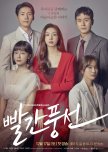
about the ´art´ of becoming an egoist
You may consider "Red Balloon" being one of those family makjang stories that come up again and again in different versions in KDrama-land. Tangled ties of fate and trauma that continue to get even more tangled and traumatizing. You might think “Yeah. Makjang again. Family drama again. Forbidden love again. Ok, you´ve seen it all. You don´t need another one.” So should you watch? You definitely don´t have to. But oddly enough: you may want to. The characters, with all their sometimes almost disturbing ambivalence, drag and pull you under their spell. Subtly, unperturbed, whether we're watching or not: they are struggling to function and survive within their dysfunctional relationships and families... and on top of it: they are even longing for far more than that.2022/23 "Red Balloon" infiltrates South Korean homes as the red-hot contemporary document of a complicated ordeal, which society increasingly has to deal with. On the one hand, family is regarded as the highest value in society. On the other hand, within the last decades national divorce rate has reached the tops in worldwide comparison. Yet, divorce is still seen as a shame – a topic for ´other´ families only (if at all). Nevertheless, more and more South Koreans are choosing this path, even the 'elderly' (those over 60 and even over 70) are increasingly opting for divorce. The KDrama juxtaposes the hardened socio-cultural fronts within a fictional story that listens to both sides equally, gives space, allows themselves to be rubbed against each other – sometimes loudly, sometimes violently – and struggles to find solutions.
Throughout the KDrama, events and emotional ordeals continue to get worse. Seasoned with gradually increasing makjang tension, with complex personality portraits, as well as poignant, excellent pleas (sometimes for one, sometimes for the other and sometimes for yet another position), the KDrama screws itself deeper and deeper into the increasingly heated minds of the audience. "Red Balloon" succeeds excellently in taking its often head-shaking viewers into truly impassable, controversial socio-cultural terrain and, with the concentrated confrontational dramaturgical charge of emotional ambivalence, exemplifies what would be, could be, yet must not be, however wants to be possible, (and after all IS possible in South Korea 2022/23).
There are multiple storylines that are heartily intertwined. But they all deal with the same topic: the critical fine line between a so called ´satisfied´ life (as one normally lives / should / has to live / pretends to live) and a self-abnegating, self-deceiving ´dissatisfied´ life; the latter mostly going unnoticed, though, because actually everyone lives that way and it seems to be the most natural thing in the world... Dissatisfaction only becomes critical, if someone can no longer ignore that this supposedly ´satisfied´ life is actually a 'dissatisfied' one. The subtle psychological tension of the KDrama emerges in the conflict between traditionally unquestioned, accepted customs and the individual urge for deviation, which (here) rages more or less intensely in almost all of the protagonists, and erupts in an attempt to break free. Daring to dream, being honest with oneself and eventually even making the necessary efforts... but, alas, also being sincere in respect to the social environment? Ready to disappointing the expectations of others? Prepared to missing duties and responsibilities? To hurting loved ones, too? Has actually anyone ever honestly tried to truly walk along his/her individual path sincerely upright? (At least when it comes to South Korea 2022/23, so far there are hardly if any role models whatsoever.)
"Red Balloon" can be considered a social study using the example of the microcosm of three families, that are connected, among others, through a (not quite balanced) childhood friendship between two female protagonists. Yes, one could bitch and nag about prevalent adultery among the protagonists. On the other hand, in this case I´d like to set a different focus, that is: Collectivism in conflict with increasingly burgeoning individualism. Against this background, it is more about the 'art' of becoming an egoist. (See side note below). In a society shaped by collectivism, social class and hierarchy like South Korea, 'egoism' (=standing up for individual needs, even in the face of social pressure) has so far not been a quality in itself. On the contrary. The development of such an independent and socially recognized value is in its infancy there. The protagonists are correspondingly insecure and sometimes stumble, doubt themselves, look for a turnaround and reflect on the old values... which include: doing what other, older, financially better off fellow human beings say, want, demand. (And thus, often enough being humiliated, too. A life full of sacrifice, humiliation and shame is quite normal. Most people live that way. Accordingly there is nothing wrong with it, right?)
Shameless adultery might be one side of the medal. The other side, however, represents the widespread, customary long ignored individual dissatisfaction for the sake of ´the group´ (family etc.) that some can no longer cope with. The KDrama team draws memorable portraits of people at different ages, who have their quirks like anybody else. At some point, they try to stumble free from the expectations of others and rather follow their gut. They want to, and choose to live up to their own desires... struggling, staggering, falling in the face of the mercilessly blowing headwind. There might be an urge to break free of a tight corset of expectations and obligations – yet, just daring to think in this direction is considered shameless and despicable... Sympathy for family struggles, sacrifices, deprivation and suffering, on the other hand, is widespread, because this individual pain results out of self-sacrifice for the 'group' and in this case is downright virtuous. (The KDrama Orbit has told countless stories of this virtue since the earliest productions.) Sympathy for 'individual' pain however, e.g. suffering from the group pressures and demands, is hard to find. With a newly found egoism and its associated pains one is left alone... Well, has been, so far. Not anymore. This is where "Red Balloon" comes in… at least with an example of role models on fictional playground.
With its tricky, controversial topic, the KDrama hits the mark of many minds in the country. The audience of "Red Balloon" had quickly doubled and after half of the 20 episodes even tripled. Eventually, for the audience throughout the rest of the world it offers plenty of KDrama-Quality, too.
--------------------------------------
SIDE NOTE: --- Life satisfaction in South Korea ---
The latest data on quality of life, published by the Republic's statistical office in 2022, ranks South Korea 36th among the 38 OECD countries. (Only in Turkey and Colombia life satisfaction is worse.)
What feels like exaggerated makjang for some (especially for audience with nationalities of the other 35 member states) is pretty close to everyday life for many (South Koreans) sitting in front of their home TV...
------------------------------------------
SIDE NOTE --- The ´art´ of being an egoist ---
In 1976 the book “The Art of Being an Egoist” by Josef Kirschner was published. In it, the author works out the necessary, ambiguous psychological process and the stamina, the required perseverance, you need regarding individual (=egoistic) life decisions that are geared towards personal needs (=against the interests of the community/group/family). Self-love is a crucial step towards accountability (vs. behaviour determined by others) and thus forms the basis for free, responsible, caring citizens. However, even after all those centuries, egoism is (still) widely devaluated in individualistic Germany/Europe, too.
That´s because, egoism and the group are generally at war. The more submission the family/group/society structurally expects of its members, the less space individual needs have and the more shameful and banished they are. The protagonists in South Korea 2022/23 (which is characterized by collectivism and has a strong hierarchical structure) have to deal with just this problem. The theme here is the struggle for a psychologically healthy egoism for one's own good. The thesis behind: Honestly towards myself and content, I am able to approach others sincerely and freely give of myself, contribute and care about others. That´s because I want to. Not because I have to, (even though I feel wronged, indigent or missed out.) I care for myself. And then, additionally, I can truly care for others, too. Like the sign in the airplane says: you should put your oxygen mask on first before trying to help the person next to you…
PS:
(This 'egoism', which is based on self-love and mature personal responsibility, should not be confused with insatiable, ruthless and mostly immature greed. KDrama-orbit is full of greedy contemporaries, because unfortunately greed is cross-culturally human and can thus be found all over the world. Greed has no social component. With greed, nothing positive flows back into the group.)
--------------------------------------
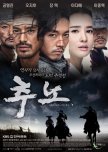
Tragic, epic, visually impressive.
"The Slave Hunters" is a cinematic-style KDrama, almost like a movie for the big screen. (It would definitely be an experience on the big screen.) In any case, "The Slave Hunters" has a lot to offer during ist 24 episodes.
There is strikingly selected staging of the landscape. Korea presents itself self-confident with its countless riverscapes and deltas, its mountains and coastal regions. The viewers visually accompany the protagonists on their long journeys across the country.
The accumulation of well-trained, well-structured torsos of the male actors is also characteristic for "The Slave Hunters". There's a lot of work involved, and it's appropriately staged here in numerous shots. Why not?
In connection with its sporty mimes, "The Slave Hunters" also comes up with a variety of brilliant, sometimes spectacularly choreographed fight scenes. Above all, Jang Hyuk once again sets quite a monument with his versatile martial arts skills.
The KDrama also presents - if you like - some Joseon-style parkour. 'Chase' thus gets a nicely invigorating touch. (Side note, in case you don´t know: Parkour is a special form of athletic movement art - a mostly urban steeplechase that has become fashionable in the last few decades. Individuals choose the most effective way to get to their destination, and that's hardly ever the predetermined path. Rather, the urban or natural landscape is re-perceived with regard to potential obstacles and evaluated as to how these can be creatively overcome on the individually chosen route, for example by jumping, somersaults or the like.)
The KDrama also stresses the subject of fatal love triangle in its complex emotionality. Eventually, there are also more love stories in the side plots. Yet, to be honest, the romance aspect should not be your reason to watch... The complicated dynamics might drive you crazy at times, so does the rigid play of the ex-and-again-general.
After all, the story mixes a good pinch of humor with profound wisdom. Surrounded by all the muscle-packed, fast-paced spectacle, the question of how a just society can be achieved is examined, i. e. whether it can ever be achieved at all. As soon as people gain power, won't they always tend to turn their fellow human beings into slaves, chattel or lackeys? And: will a changed political system change the people? Or do people have to change for the system to change? As a premise it is stressed that slaves are also human beings, e. g. that it actually starts with an attitude, that one should not deny any human being to being a human being - certainly not according to their genetic origin. "Slave Hunters" historically refers to the beginning of socio-critical Yangban movements against practiced slavery.
At the same time, the KDrama shows life under simple/poor living conditions - unembellished in all coarseness, e. g. ugly, blustering, brutal, unkempt and uneducated, but still warm-hearted. On the other hand, the fine silk clothings and the well-groomed, educated demeanor of the nobles and officials cannot hide their emotional coldness and corrupted souls.
All in all: It is not surprising that the KDrama in average thrilled more than 30 percent of the South Korean population and received numerous respectable awards and even international nomination. Above all, Jang Hyuk, for whom his role seems to be tailor-made. He fights, jumps, sprints, barks, laughs, cries, digs into the deepest depths of his soul and on top of that presents profound street smart and wise philosophies.
"The Slave Hunters" has a charm of its own. It´s tragic, epic, visually impressive.
---------------- Side Note: --- historical background ----
The historic frame refers to the time of King Injo in the 17th century as well as his son and Crown Prince Sohyeon. As a result of the submission after the second Manchu invasion in 1636, the Crown Prince (together with his wife and other officials) went to Shenyang practically as a hostage of the Qing. He spent his time there working diplomatically on peaceful relations between the Joseon and Qing dynasties.
His commitment also brought him to Beijing, where he became familiar with Western culture through his acquaintance with Jesuit missionaries. However, his father did not like Sohyeon's diplomatic commitment and open-mindedness at all. He feared that after his return and accession to the throne, he would want to reform Joseon with Catholicism and Western values. Prince Sohyeon's sudden death is interpreted by historians as deliberate poisoning. There is some evidence that his own father was behind this. Sohyeon's wife was executed for treason and only the youngest of his three sons survived their exile on Jejudo.
---------------------------------------------------------------------
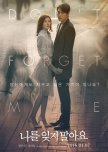
A love story, that is told in a completely unorthodox way. Impressive in a refined manner
Capturing so much feeling quite sensitively and lifelike, “Remember you” is definitely for KMovie connoisseurs - with a memorable story and two wonderful leads deeply touching the audience's soul.However, the story is not at all concerned with meeting common audience expectations. The KMovie chooses its own pace while poetically linking the loose threads into a three-dimensional pattern – in a stringent but by no means linear manner, purposefully but without any haste.
“Remember you” (or rather “Don’t forget me”, as the original title says) is mostly a love story through and through. However, it is a love story, that is told in a completely unorthodox way.
The past that lies behind – with the memory of it having the potential to ripping emotional abysses with brute force. The future, that lies ahead – with hope dwelling inside. The present – in which the ´now´ can become a safe zone. Within and throughout: the transcendent power of love.
There is something meditative about “Remember You”. We´re stumbling alongside the amnesiac protagonist through his (to him) strange present, with people coming and going. It almost feels like in a dream. He acts on the outside while inwardly commenting and silently asking his questions to an inner authority that should know... But the inner authority is mute.
The memories of the male protagonist, who suffers from amnesia, come back in fragments and immediately collapse again. The soul has found its own ways in dealing in a somewhat more bearable way with an almost unbearable reality. But ultimately, this situation, too, still is not really bearable either. The KMovie portrays a desperate psychological wrestling with reality - of the male lead on the one hand, and the female lead on the other.
Before we notice it, at the latest as soon as the puzzle has been put together, we suddenly find ourselves very close to the no less desperate inner world of the female lead. After being very close to HIM for so long and learning to feel with HIM, we suddenly find ourselves compassionate with HER emotional horror trip...
Impressive in a refined manner!
PS:
The KMovie “Remember You” is based on a short film by the same director. Based on this template, crowdfunding was used to raise funds for an international independent cinema film production. $32,000 was donated for this purpose. When it premiered in South Korea, “Remember You” grossed around $2 million already.
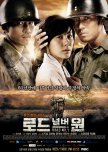
Romance & Bromance at its best in (still warlike) post World War II years on once Joseon´s soil
"Road No. 1" is an intriguing KDrama that takes a close look at the (still warlike) post-war years in Korea after 1945. On impulse we might think of the Korean War of 1950-53, but for the Korean people the struggle between North and South began much earlier (see below if you like).There are definitely plenty of tragic fates and stories to tell from that time. "Road No. 1" is one of them, splendidly captured within 20 episodes full of human struggle for life and love. Here you will find romance and bromance at its best. Emotively staged against a backdrop of uniforms, guns, grenades, explosions, barbed wire, the 38th parallel and Road No. 1.
------------------------------------------------------------------
Side Note: ---- HISTORIC BACKGROUND ----
The 'No. 1' is the road that connects Seoul and Pyongyang - after the end of World War II in 1945, these were the two largest cities in Korea, having been annexed by Japan since 1910 as the Chōsen province. After the surrender of Japan, the province of Chōsen was (like Japan itself) occupied by the Allies. The Soviet Union and the USA, as trustee administrators, had divided the country along the 38th parallel into two occupation zones. In fact, the Korean people weren't too keen on (again) not being given state sovereignty.
With the departure of the Japanese, the struggle for the future of the country began - a struggle between different visions and perspectives. The allies favored the political positions they liked - e.g. Joseph Stalin and Mao Zedong with Kim Il-sung a communist state in which only one politically active party should exist; the USA a Western-style constitution for the South with a Christian-capitalist orientation. However, there actually was also a nationalist, anti-foreign grouping within the country that (by tradition) particularly opposed the American occupation and its Western values. They engaged in a guerrilla war that began as early as 1946. That is, where "Road No. 1" has its roots and starts off. And that's a good thing, because this aspect is sometimes lost in the historical representation of the western hemisphere...
This resistance struggle´s position was much closer to communist ideas than to the western value system, which still seemed rather foreign up to that point. Just because the former colonial ruler Japan was one of the losers of war, the former Joseon doesn't have to be happy to make a 100° about-face towards Western democracy... What the country or its people wanted was actually not seriously considered. The promised election did not come about. It simply fell underneath the wheels of the Cold War. For the Soviet Union and the USA, Korean policy was based on post-war events and global political muscle flexing. However, for the Korean people, who had never been never tired of resisting oppression under colonial rule, things just kind of went on. From the rain in the eaves...
--- People's Republic of Korea - a non-starter ---
In fact, it completely escaped my historical knowledge that BEFORE the division into a communist North Korea (Democratic People's Republic of Korea) dominated by the Soviet Union and China plus a South Korea occupied by the USA (Republic of Korea), there had also been a KOREAN vision for the future of the peninsula. After Japan's capitulation, the 'People's Republic of Korea' (NOT EQUAL to the Democratic People's Republic of Korea alias North Korea) was proclaimed as a provisional government on September 12, 1945 for BOTH zones of occupation. Initially, the basis of the new constitution and government was supposed to be created from a network of people's committees. The program was radically social. The aim was to establish Korea's complete independence and a democratically governed public life for a free people.
In the north, the People's Republic was taken 'seriously' by the communist occupiers (effortlessly, so to speak, due to the similar attitude). In the south, however, the military controlled political events were based on a rigorous anti-communist attitude. Of course, the USA did not like this communist-affine new political perspectives towards the peninsula at all. In 'their' southern provinces, they even went so far as to ban the ´People's Republic´ (purely because of its communist ideas). This fueled resentment... and there it was again: resistance.
--- National Uprising ---
In 1946, the so-called Autumn Harvest Uprising marked the beginning of public, sometimes massive, resistance, which took on further forms in 1947 and finally culminated in a national uprising in 1948. The USA had to react quickly and so they sponsored the lesser evil: the elections for the first 'Republic of Korea' in August 1948: the autocratic Rhee Syng-man. Although he was not in principle friendly to the USA, nor was he an enthusiastic democrat or even an advocate of human rights, he was opportunistic enough to also cooperate in the interests of the USA. He was also anti-Japanese and anti-communist. South Korea was given a Western-style constitution, and from then on it had to be guided by Christian and capitalist values. Of course, after the South voted, the North had to follow suit (with the formation of the DPRK).
The Korean people were thus separated - politically, geographically, economically and socially - and had been incited against each other by propaganda and degraded to the pawn of global political muscle flexing. Industry, resources and energy supply were concentrated in the north, while two-thirds of the 30 million Koreans were living in the south. And they initially fought against the paternalism of the American military. Between 1948 and 1950, guerrilla fights against the South Korean Republic's military and police cost the lives of around 7,500 official security forces and around 34,000 civilians - even before the actual Korean War even began. The people strived for unity. But politically there was only an either-or (communism vs. ultra-nationalism).
--- Korean War with international participation ---
In 1950, Kim Il-sung made use of the situation in the south as well as of his military and material superiority. He wanted unite the country in his interests (and under his constitution). Rhee Syng-man had his military resist as best they could until international intervention by the UN led by the USA actually pushed back the North Korean army. However, in view of the new situation and the global dimension, China rushed to North Korea´s aid. There was fierce fighting, on land and at sea. At the end, the armistice, which is still in force today, includes the concession against the background of the Cold War that there will still be the Republic of Korea in the south and the Democratic People's Republic of Korea in the north.
After ca. 2 million civilians, around 1 million Korean and Chinese soldiers, as well as ca. 40,000 UN soldiers having given their lives to this war, everything remained just as it had been before. In sum: A divided country that had been cheated of its autonomous sovereignty. Patronized Koreans. A people with split identity. Separated families.
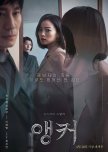
Haunting psychothriller. Rather psycho-logical. Intense acting of a fantastic trio.
"Anchor" is a psychological thriller set in the competitive world of TV news anchor. A nightmare on the edge of a horror trip begins, as Jung Se-ra receives a strange phone call, followed by fatality. Se-ra sets out to investigate herself... Eventually a psychiatrist plays a dubious role, starting to increasingly influence Se-ra´s world. Her manipulative controlling mother on the other hand cannot tolerate this. Increasingly, realities become blurred. What Se-ra finds out in the end is downright shocking.Like I said, this is a psychological thriller. On top of that, it gets mysterious, psychologically complex and a bit uncanny at times. Viewers see the world through the eyes of Jung Se-ra (impressive: Chun Woo-hee), who is getting confronted with her own blind spots. Tugging on one side is her dominant mother (spooky: Lee Hye-young), while on the other side the provocative psychiatrist In-ho (unfathomable: Shin Ha-Kyun) plays with fire confronting Se-ra's psyche with hypnosis.
"Anchor" clearly thrives on the intense acting of this fantastic trio. Haunting.
PS:
Don´t expect to get all the answers straight - the KMovie is rather psycho-logical.


 9
9 37
37 15
15


















